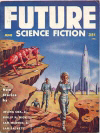
Credits Navigation philipdick.com Novels Short Stories References

Writing Date |
Pub. Date |
Previous |
Next |
Notes |
|
70 |
<Nov 19, 1953 |
Jun 1954 |
9500 wds |
FIRST PUBLICATION
 Future
Science Fiction, Jan 1954 {ill. by Luton}
Future
Science Fiction, Jan 1954 {ill. by Luton} HISTORY:
Only one short story was sent to the SMLA in November 1953 and this was "Sales Pitch" which arrived on the 19th. The Agency knew right where to send it and it was published in Future Science Fiction in the Jan 1954 issue. Later Mark Hurst selected the story for inclusion in his PKD collection, THE GOLDEN MAN (1980) and Patricia Warrick chose it for her 1984 collection ROBOTS, ANDROIDS AND MECHANICAL ODDITIES.
This story is another slap at rampant consumerism with a domestic robot that refuses to take no for an answer as it foists itself on an unsuspecting family. Sure, the fasrad can do just about anything around the house; but its all too much for the harried and harassed homeowner who determines to escape the non-stop intrusive advertisements that dog him on his long commute from Earth to Ganymede. In a desperate attempt to reach the colony worlds on Proxima Centaurus, the businessman takes the fasrad along (he had no choice; it came). But his ship is a family model unsuited for the long trip to Proxima and breaks down before reaching its goal. The fasrad does its best to keep the ship going but ultimately fails. In the end the businessman is left with only the broken fasrad for company. And to make matters worse, it delivers its sales pitch ad nauseum.
"Sales Pitch" is one of my favorite PKD stories. The opening section dealing with the long commute to Earth from Ganymede is pretty funny and reminiscent of the beginning of THE UNTELEPORTED MAN.
PKD wrote this about "Sales Pitch":
When this story first appeared, the fans detested it. I read it over, perplexed by their hostility, and could see why: it is a superdowner story, and relentlessly so. Could I rewrite it, I would have it end differently. I would have the man and the robot, i.e. the fasrad, form a partnership at the end and become friends. The logic of paranoia of this story should be deconstructed into its opposite; Y, the human-against-robot theme, should have been resolved into null-Y, human-and-robot-against-the-universe. I really deplore the ending. So when you read the story, try to imagine it as it ought to have been written. The fasrad says, "Sir, I am here to help you. The hell with my sales pitch. Let's be together forever." Yes, but then I would have been criticized for a false upbeat ending, I guess. Still, the ending is not good. The fans were right.
"Sales Pitch" rates ó ó ó ó ó
Other Magazine and Anthology appearances
| 1980 |  |
THE GOLDEN MAN, Berkley, pb, 04288, 1980, ?, $2.25 (?) {Ed. Hurst} | |
| 1984 |  |
ROBOTS, ANDROIDS AND MECHANICAL ODDITIES, {Ed. Warrick} | |
| 1987 | THE COLLECTED STORIES OF PKD | ||
NOTES:
THE GOLDEN MAN story notes by PKD
When this story first appeared, the fans detested it. I read it over, perplexed by their hostility, and could see why: it is a superdowner story, and relentlessly so. Could I rewrite it, I would have it end differently. I would have the man and the robot, i.e. the fasrad, form a partnership at the end and become friends. The logic of paranoia of this story should be deconstructed into its opposite; Y, the human-against-robot theme, should have been resolved into null-Y, human-and-robot-against-the-universe. I really deplore the ending. So when you read the story, try to imagine it as it ought to have been written. The fasrad says, "Sir, I am here to help you. The hell with my sales pitch. Let's be together forever." Yes, but then I would have been criticized for a false upbeat ending, I guess. Still, the ending is not good. The fans were right.
SRG 52
... "Sales Pitch" with its multiform advertising intrusions startles with a threatening possibility that we cannot turn off with the flick of a switch the "fully automatic self-regulating android" designed for taking over all tasks, domestic, bureaucratic, and social. Here is the technological uninvited guest, fully programmed to integrate itself into the human world despite any resistance.
Collector’s Notes
Credits Navigation philipdick.com Novels Short Stories References